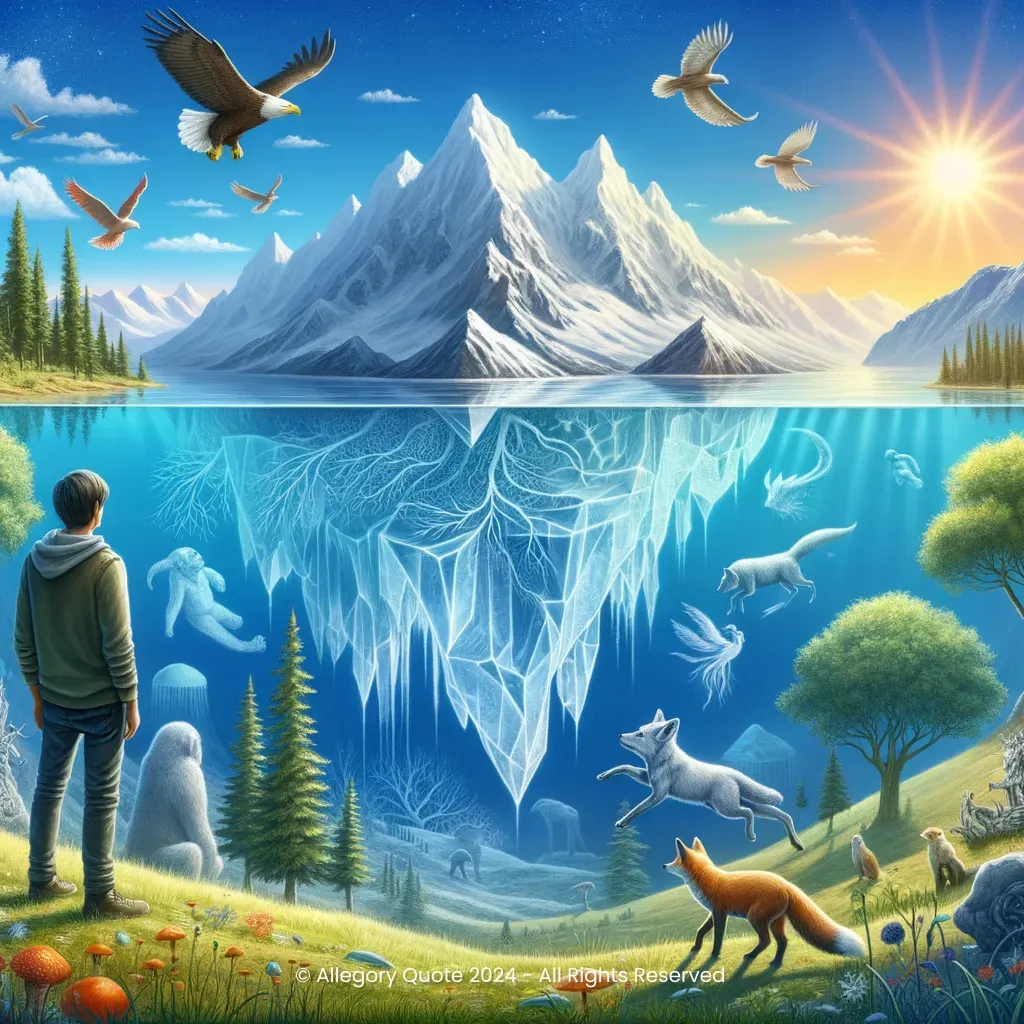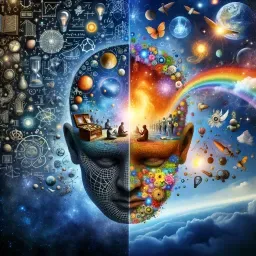Seeing is quite different from knowing

0
0
0
0
- Meaning
- The phrase "Seeing is quite different from knowing" suggests a fundamental distinction between superficial perception and deep understanding. Seeing involves the physical act of observing, while knowing requires a more complex process of learning, analysis, and comprehension. This concept can be viewed in both philosophical and psychological contexts as a reminder not to limit oneself to the surface of things, but to strive to understand their essence by going beyond what is immediately visible. The phrase can also reflect an important life lesson: not everything that appears on the surface is what it truly is, and to really understand something—or someone—it is necessary to dig deeper, beyond appearances, to comprehend its true nature and context.
- Allegory
- The individual observing the lake represents the act of "seeing," while the hidden iceberg symbolizes the deep knowledge often not immediately visible. The trees with deep roots illustrate the process of growth and the acquisition of intricate understanding. The animals, such as the eagle (vision) and the fox (cunning), reinforce the importance of different forms of intelligence and perception. The mountains and the rising sun further emphasize the theme of discovery and exploration, suggesting that there is always something larger and deeper to discover if one has the willingness to look beyond the surface.
- Applicability
- The meaning of this phrase can be applied to countless situations in daily life. For example, in interpersonal relationships, it is crucial not to stop at the first impression but to truly get to know people to appreciate their qualities and understand their flaws. In the professional world, it can mean that qualifications or professional demeanor alone are not enough; a true understanding of a person's skills and abilities is necessary. Additionally, in academic life and research, merely seeing the data is not sufficient; it needs to be interpreted and analyzed in depth to gain real and meaningful knowledge.
- Impact
- This distinction between seeing and knowing has had a significant impact in various fields. In philosophy, similar concepts have been explored by various thinkers, such as Plato with his Allegory of the Cave, where the truth was hidden behind visible shadows. In psychology, there are studies on perception and reality, and in literature, many authors have explored the theme of superficiality versus depth. This dualism has inspired discussions on the value of deep knowledge compared to the superficial vision of things and people.
- Historical Context
- Criticisms
- Some criticisms of the phrase might come from those who argue that seeing can already provide a significant amount of information and that often visual first impressions are also accurate. There could be a debate about whether vision is necessarily inferior to knowledge, suggesting that both have their place and relevance depending on the context. Others might argue that knowledge often stems from what we see and perceive, and that the two processes cannot be completely separated.
- Variations
- There are similar variations and interpretations in different cultures around the world. For example, the ancient Chinese proverb "鬥米之炊,三人縛雞," which translates to "It’s like cooking a pot of rice with a single grain, but tied to three people," implies that appearances can be deceiving and that there is a need to strive to understand the broader context. However, the interpretation of the phrase may vary between cultures, with some placing greater emphasis on wisdom gained through direct experience and others valuing abstract thinking and inner reflection.
-

The road to hell is paved with good intentions.
-

Imagination is more important than knowledge.
-

Real knowledge is to know the extent of one's ignorance.
-

The more I learn, the more I realize how much I don't know.
-

Do not impose on others what you do not wish for yourself.
-

The journey of a thousand miles begins with a single step.
-

These aren’t the droids you’re looking for.
-

Appearances can be deceiving.
No Comments